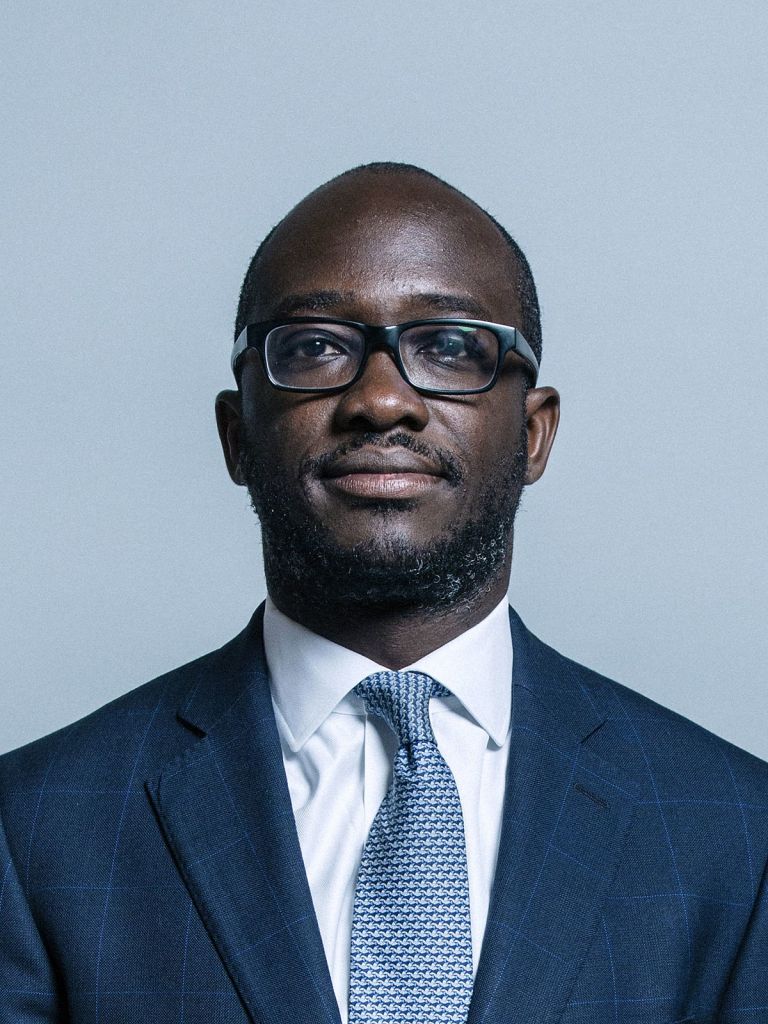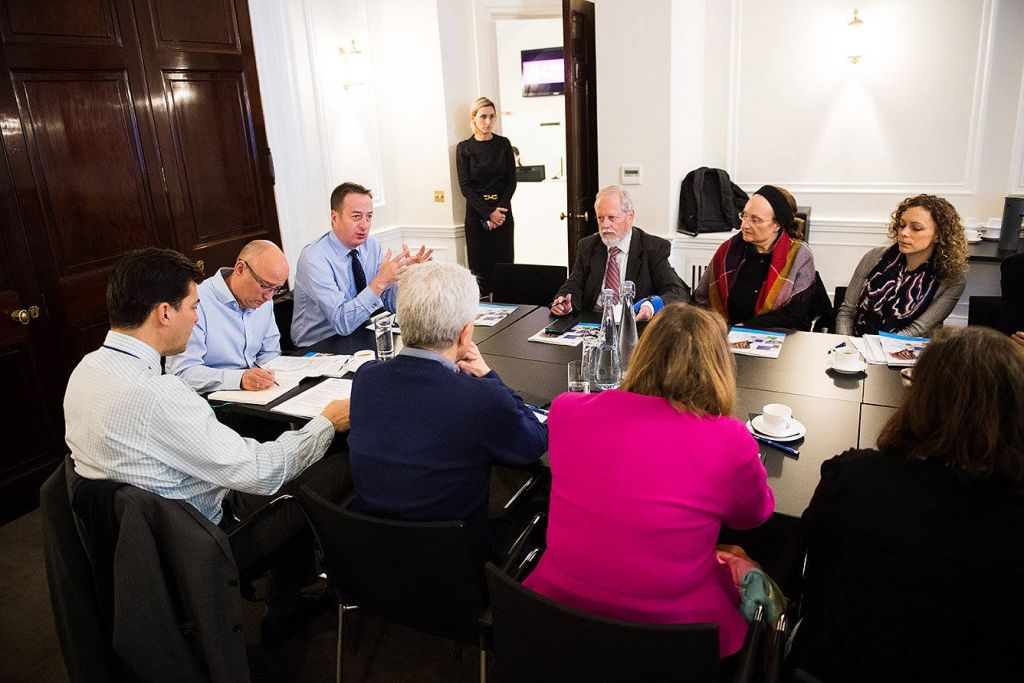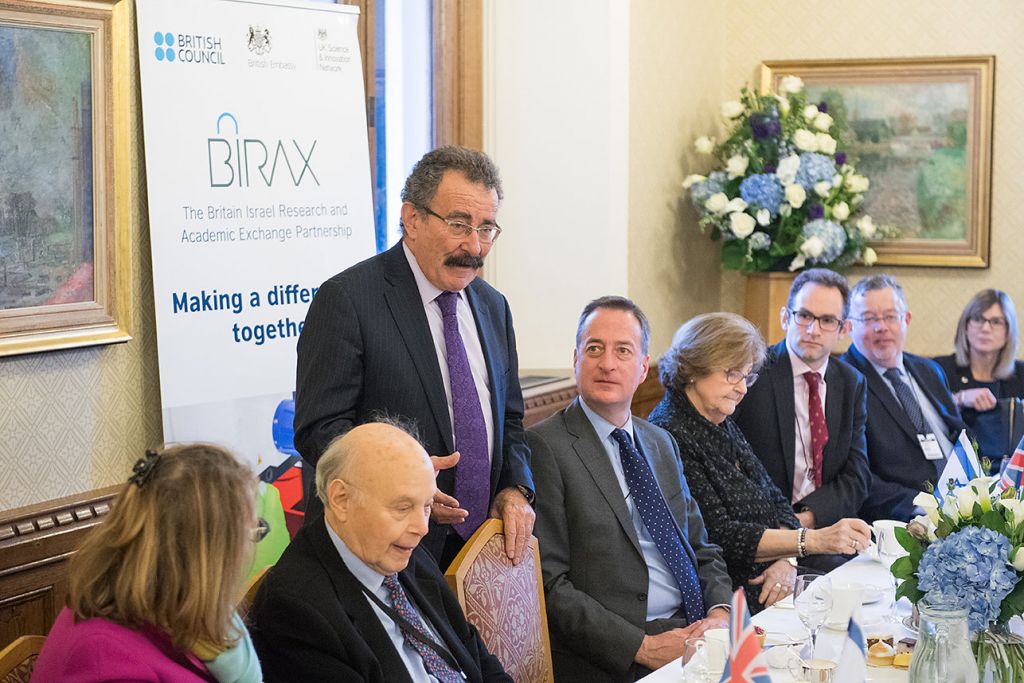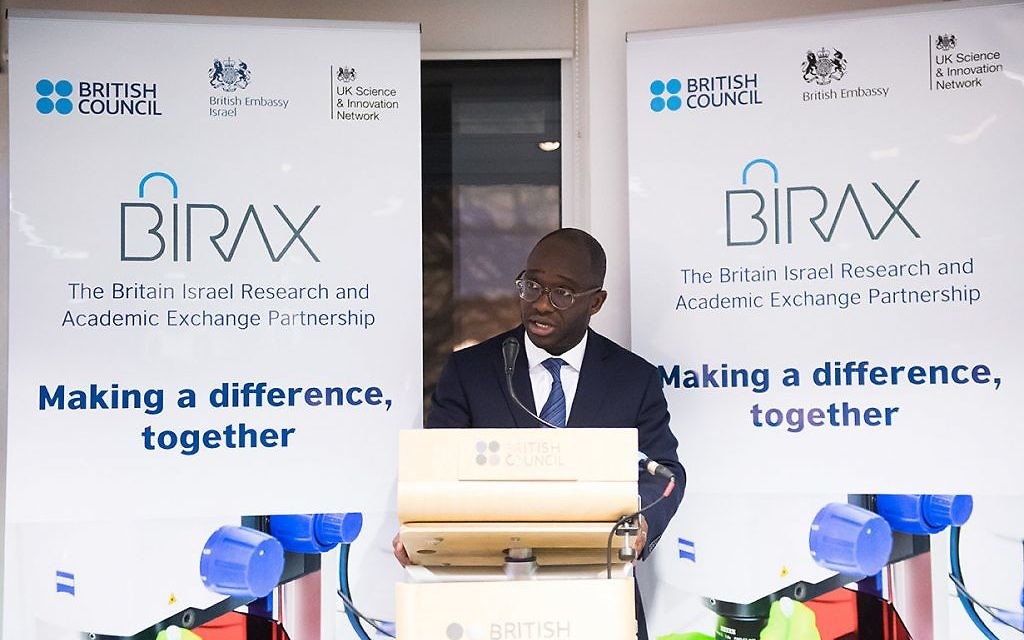UK Science minister Sam Gyimah: Collaborating with Israel is a ‘strategic priority’
Sam Gyimah speaks to Jewish News during the launch of an exciting new scientific partnership between British and Israeli researches
Sam Gyimah shakes hands and sits down in a dull side-room at the British Council near the Mall, having just told a roomful of VIPs that Israeli and British scientists are to work together on diseases associated with ageing.
Short, studious and smartly dressed, this is the new 41-year old Minister of State for Universities, Science, Research and Development who knows that Israel is pretty hot in all these areas. What follows is an interesting 20 minutes.
Born in the UK, Gyimah spent ten years growing up in Ghana, before returning to England to study Politics, Philosophy and Economics (PPE) at Oxford University, becoming President of Oxford Union. From there he joined Goldman Sachs before setting up his own recruitment company. So far, so future Tory leader.
Get The Jewish News Daily Edition by email and never miss our top stories Free Sign Up
In his 30s he entered politics and became a Government whip in 2013, around the time British and Israeli scientists first began collaborating through the BIRAX partnership, starting in regenerative medicine. Listening to him, it’s clear science and technology are interests of his, but only when he took over from Jo Johnson in January did they become part of his brief.
He says he signed a memorandum of understanding l in the UK with his opposite number three weeks ago, and plans to visit later this year “to deepen our collaboration not just in scientific research but in innovation and opportunities that are mutually beneficial for high-growth business.”
So, beyond the lab, then? “We’re looking across the board at how we can do more with Israel,” he says. “Collaboration with Israel is something we want to build on as a strategic priority.”

In what areas? Yes, medicine is one, he says. “But I’m particularly focused on innovation. One thing Israel is really good at is commercialising new technology, maximising how research ideas are exported. Those are areas where I see us working together.”
A month into the job and he’s already met the Israelis? What did he think? There’s laughter and unease in equal measure. Some Israelis are in the room and now lean in to hear the answer. Finally, he says: “They’ve very clear on what they want.” I’ll bet they are.
“I met the Israeli science minister. He was very clear on what he wanted. In the end I had to ask him explicitly, ‘what do we get out of this?’”
What, indeed? Could Israel help Britain make a culture-shift? He’s still analysing the problem. “I started off thinking we’re not very good at commercialising our research, but there’s another argument, that sometimes we try to commercialise it too early, spending time with patent lawyers and such when it should be spent solving the problem.”
An Israeli in the room says each university has its own legal department to take care of all that, and Gyimah acknowledges “Israel’s track record”, especially in “disruptive technologies,” and says universities being awarding money based on excellence or based on what could conceivably come to market can be two very different criteria.

Is he worried about Brexit? A Tory ‘remainer,’ he’s uneasy when asked about Britain’s science prospects outside the EU – hours before our interview, Professor John Hardy at UCL gave his share of a 1 million Euro prize (awarded for his work on Alzheimer’s) to an anti-Brexit group, saying Brexit is “an unmitigated disaster for science and for our health service”.
Gyimah tries to be upbeat, noting new links with China and the US. “If we want to be the go-to place for scientific innovation, then it makes sense that we work with all the other leading countries in this area, of which Israel is a key player.”
He describes the UK and Israel as “scientific superpowers” and on Brexit, says “science is one of the areas where there can be a win-win between the UK and the EU,” adding that his European counterparts “recognise the value we bring”.

Gyimah says the UK does well out of EU funding programmes like Horizon 2020 “because grants are awarded on the basis of excellence”. Israel is a member of Horizon 2020 too, he says, “and also does very well out of it”.
Is this BIRAX partnership principally about ideas, or people, or both? The latter, he says, but people are a big part of it. “Getting the right people, that exchange of academics [from the UK and Israel] is something I’ll be looking at quite seriously. Breakthroughs happen when you have the right people working together.”
When he visits Israel, what does he want to see? He wants to understand things like “the expectations of Israeli public funds that go to universities, and how that drives the incentives to get the product to market”.
In Britain, he says he wants to see more entrepreneurship, adding: “Rather than have entrepreneurship sit in one box and academic research in another, we could do more to bring them together.” Can this be learned from Israel?
“You learn it from lots of different places. Hopefully Israel will learn something from us too. That’s what happens when we work in partnership and trust each other.”

Thank you for helping to make Jewish News the leading source of news and opinion for the UK Jewish community. Today we're asking for your invaluable help to continue putting our community first in everything we do.
For as little as £5 a month you can help sustain the vital work we do in celebrating and standing up for Jewish life in Britain.
Jewish News holds our community together and keeps us connected. Like a synagogue, it’s where people turn to feel part of something bigger. It also proudly shows the rest of Britain the vibrancy and rich culture of modern Jewish life.
You can make a quick and easy one-off or monthly contribution of £5, £10, £20 or any other sum you’re comfortable with.
100% of your donation will help us continue celebrating our community, in all its dynamic diversity...
Engaging
Being a community platform means so much more than producing a newspaper and website. One of our proudest roles is media partnering with our invaluable charities to amplify the outstanding work they do to help us all.
Celebrating
There’s no shortage of oys in the world but Jewish News takes every opportunity to celebrate the joys too, through projects like Night of Heroes, 40 Under 40 and other compelling countdowns that make the community kvell with pride.
Pioneering
In the first collaboration between media outlets from different faiths, Jewish News worked with British Muslim TV and Church Times to produce a list of young activists leading the way on interfaith understanding.
Campaigning
Royal Mail issued a stamp honouring Holocaust hero Sir Nicholas Winton after a Jewish News campaign attracted more than 100,000 backers. Jewish Newsalso produces special editions of the paper highlighting pressing issues including mental health and Holocaust remembrance.
Easy access
In an age when news is readily accessible, Jewish News provides high-quality content free online and offline, removing any financial barriers to connecting people.
Voice of our community to wider society
The Jewish News team regularly appears on TV, radio and on the pages of the national press to comment on stories about the Jewish community. Easy access to the paper on the streets of London also means Jewish News provides an invaluable window into the community for the country at large.
We hope you agree all this is worth preserving.
-
By Brigit Grant
-
By Laurent Vaughan - Senior Associate (Bishop & Sewell Solicitors)
-
By Laurent Vaughan - Senior Associate (Bishop & Sewell Solicitors)
-
By Laurent Vaughan - Senior Associate (Bishop & Sewell Solicitors)
-
By Laurent Vaughan - Senior Associate (Bishop & Sewell Solicitors)






















